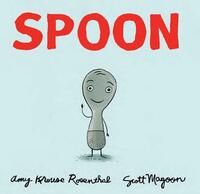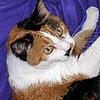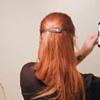Take a photo of a barcode or cover
A really simple story, with simple characters, but with a deep message.
It is enjoyable not just for my niece but also for me, as a grown-up.
Have just had a conversation about this: how we often forget to see how blessed we are, how others might see from us. Often times, we need to get out of our own thinking and try to see ourselves from other's perspective, in a kind and gentle way.
It also helps a lot to have an amazing circle that admit and say it out loud that we are enough. :)
It is enjoyable not just for my niece but also for me, as a grown-up.
Have just had a conversation about this: how we often forget to see how blessed we are, how others might see from us. Often times, we need to get out of our own thinking and try to see ourselves from other's perspective, in a kind and gentle way.
It also helps a lot to have an amazing circle that admit and say it out loud that we are enough. :)
Interesting take on self esteem, fantasy context makes the theme less didactic.
Similar in style to Krouse's other works (Little Pea and Little Hoot). Takes a unique look at the life of a little spoon - who is sad he does not have the same skills or attributes as his friends. He is reminded by his mother of all the unique things he can do.
Illustrations are cute.
Illustrations are cute.
Spoon by Amy Krouse Rosenthal predates Spork by Kyo Maclear and there are obvious similarities. Both explore ethnicity, family, and self esteem through the world of the silverware drawer.
Spoon is just that, a spoon. He's a soup spoon that also likes cereal and ice cream. He though has noticed that knives, forks and chopsticks all get to do things he can't. He becomes so focused on their special talents that he begins to doubt his own.
What Spoon doesn't realize, but his mother does, is that the forks, knives and chopsticks recognize his talents just as he recognizes theirs. She eventually gets to explain that to him and it ends happily with some family snuggling.
While my daughter picked up on the self acceptance message, she had more fun pointing out all the different utensils. She's used to our own strange jumble of old and new utensils (including chopsticks). The utensils in Krouse's book are a similar jumble.
Spoon is just that, a spoon. He's a soup spoon that also likes cereal and ice cream. He though has noticed that knives, forks and chopsticks all get to do things he can't. He becomes so focused on their special talents that he begins to doubt his own.
What Spoon doesn't realize, but his mother does, is that the forks, knives and chopsticks recognize his talents just as he recognizes theirs. She eventually gets to explain that to him and it ends happily with some family snuggling.
While my daughter picked up on the self acceptance message, she had more fun pointing out all the different utensils. She's used to our own strange jumble of old and new utensils (including chopsticks). The utensils in Krouse's book are a similar jumble.
Amy Krause Rosenthal, Spoon (Hyperion, 2009)
I was planning on reviewing this by drawing comparisons to Rene Crevel (this first chapter of one of Crevel's novels is entitle “Mr. Knife and Miss Fork”; Max Ernst's famous painting of the same name was created as an illustration for it), but let's face it, this is a thirty-two page kids' book, and even I'm not that pretentious. Really, though, when it comes right down to it, there are similarities between the two. Spoon, the title character here, is a utensil who feels inferior to his buddies fork, knife, and chopsticks. (One could also draw comparisons to the Spongmonkeys' smash hit “We Like the Moon.”) He's gripped with existential angst until (this is where the books diverge) his mom tells him about all the wonderful things spoons can do that other utensils don't, though anyone who regularly uses chopsticks will likely disagree with the idea that one can't effectively stir one's drink with them. And of course, like all children, Spoon immediately believes his mom is entirely correct about everything and goes to sleep content. It's cute, it's mildly amusing, it's entirely unoriginal. Check it out from the library before buying a copy to make sure you want it permanently. ***
I was planning on reviewing this by drawing comparisons to Rene Crevel (this first chapter of one of Crevel's novels is entitle “Mr. Knife and Miss Fork”; Max Ernst's famous painting of the same name was created as an illustration for it), but let's face it, this is a thirty-two page kids' book, and even I'm not that pretentious. Really, though, when it comes right down to it, there are similarities between the two. Spoon, the title character here, is a utensil who feels inferior to his buddies fork, knife, and chopsticks. (One could also draw comparisons to the Spongmonkeys' smash hit “We Like the Moon.”) He's gripped with existential angst until (this is where the books diverge) his mom tells him about all the wonderful things spoons can do that other utensils don't, though anyone who regularly uses chopsticks will likely disagree with the idea that one can't effectively stir one's drink with them. And of course, like all children, Spoon immediately believes his mom is entirely correct about everything and goes to sleep content. It's cute, it's mildly amusing, it's entirely unoriginal. Check it out from the library before buying a copy to make sure you want it permanently. ***





